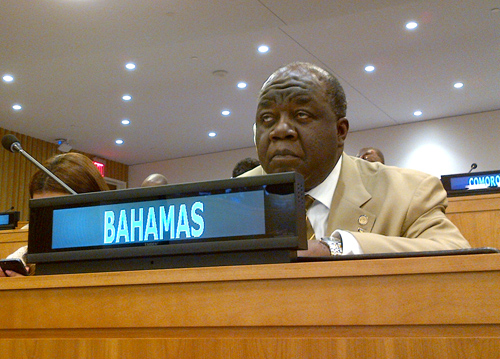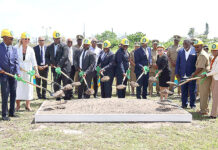By Oswald Brown

NEW YORK — His Excellency Dr. Elliston Rahming, Bahamas Ambassador to the United Nations, on Wednesday, October 23, delivered a statement on behalf of the 14 Member States of the Caribbean Community (CARICOM) in the Second Committee of the UN General Assembly on agenda item 21: Globalization and Interdependence.”
Noting that CARICOM “takes this opportunity to thank the Secretary General for the reports prepared and submitted to guide our consideration of this agenda item,” Dr. Rahming added, “We live in an increasingly interdependent world, characterized by a promise of shared beneficial opportunities, and more often than not, for small developing countries, of shared global problems. As such, forthcoming discussions of globalization and interdependence must take place within the evolving context of a post-2015 development agenda, so that the imbalance experienced by many developing countries may be addressed.”
He highlighted an excerpt from the Secretary General’s Report A/68/259, which states: “The central challenge for the post-2015 United Nations development agenda is to ensure that globalization benefits everyone, facilitated by an inclusive multilateral system. As the opportunities, challenges and risks of globalization are highly interdependent, a well-coordinated and effective multilateral approach is needed to manage globalization…Management of globalization must effectively and systematically capture the specific needs of the most vulnerable countries and people and ensure the continued centrality of those countries in the global development framework.”
“Because of our small size, open economies, geographical location and climate, CARICOM countries are among the most vulnerable,” Dr. Rahming said. “It is essential that our vulnerabilities place our countries as a central part of the global development framework, so we may benefit from the interdependent relationship, instead of only rising to meet the interdependent challenges.”
The Bahamas’ UN Ambassador emphasized that CARICOM “has consistently highlighted the persistent and ever widening inequalities between developed and developing countries, so we welcome the Secretary General’s report which notes that a leading objective of the post-2015 development agenda must be to target countries that have been left on the margins.”
“For far too long, our developing states have borne the negative effects of globalization, including climate change and the economic crisis, of which we are still reeling from the impact,” Dr. Rahming said.
Pointing out that the UN Task Team on post-2015 noted that “partnerships, including in the areas of trade, migration, ODA and technology, have direct implications for whether inequalities can be reduced or are exacerbated,” Dr. Rahming said, “Consequently, a post-2015 development agenda will need to include a strengthened global partnership framework to ensure fairness and equality across all borders and oceans.”
He added, “In addition, we have also been bombarded with the illicit side effects of globalization, including human trafficking, money laundering, narcotics, and the illegal small arms and light weapons trade. As a region with good governance and strong anti-corruption apparatus, CARICOM was very vocal in the negotiations of the Arms Trade Treaty. The adoption of this treaty has been a step in the right direction, and like the post-2015 agenda, can only be implemented with an effective and strong multilateral process.”
Declaring that the Caribbean Community “is extremely concerned with the issues of differentiation and graduation, and how they affect access to funding,” Dr. Rahming said CARICOM welcomes the Secretary General’s report on Development with Middle-Income countries, as it reiterates and expands on the point made on numerous occasions by CARICOM that “countries in this group are vulnerable to being caught in a ‘middle- income trap’, where they lose competitiveness compared to low-income countries, but lack the technological edge to catch up with high-income countries.”
“Our inherent vulnerabilities to increasingly frequent natural disasters, threatens our economic growth and sustainable development,” he said. “Any gains made are quickly lost.”
Referring to the Secretary General’s report, he said it notes that “Growing vulnerabilities have meant an increased frequency of crisis, and of countries, that remain in crisis and transition situations. These illustrate the changing demands of managing globalization,” declaring that these “demands that have yet to be met or even addressed despite frequent calls for such.”
It has been noted, he said, for example, in report A/68/265, that “in the Caribbean, a number of countries stabilized and even reduced their public debt ratios before the global financial crisis, underpinned by economic growth.”
“However, even though CARICOM’s contribution to the creation of these crises is negligible, there has been a disproportionately severe and negative impact on our countries because of the close linkages with the United States and Europe and a significant reduction in tourism income,” Dr. Rahming said.
CARICOM does not believe, Dr. Rahming added, that these specific vulnerabilities faced by Small Island Developing States are reflected in the economic classification of countries, and is very pleased to note the Secretary General’s observation that “classifying a country based solely on an average monetary value can justifiably be seen as incomplete and in need of refinement.”
“The Caribbean Community believes that a post-2015 development agenda must address these issues, and appeals to the international community to support the region’s call for the immediate review of the criteria used by multilateral financial institutions and some development partners to graduate small highly indebted middle income countries from access to concessional resources,” Dr. Rahming said.
He added: “CARICOM calls for a fair and equitable global trading regime, which addresses emerging issues of importance to small vulnerable economies, and reduces barriers to trade among developing countries. In that regard, CARICOM is extremely concerned about the effects originating from trade-distorting subsidies such as those provided to multinational rum companies. For some of our member states, as is well known, rum production is not only of historical value, but one of our last competitive industries.
Dr. Rahming referred to a declaration by CARICOM’s Council for Trade and Economic Development (COTED), which noted that “the rum industry is a substantial employer and a major contributor to foreign exchange earnings and government revenues.”
“These subsidies create a blatant disadvantage to CARICOM distillers and threaten the long term viability of the rum industry in the Caribbean,” Dr. Rahming reasoned, in urging “the involved Governments to work with CARICOM to restore the competitive balance to the rum market.”
CARICOM, he said, reiterates that the United Nations post-2015 agenda “needs to address the increasing inequalities between countries, and ensure that globalization benefits all countries and not just a selected few.”
He reaffirmed CARICOM’s commitment “to engage in all deliberations of the Second Committee in a constructive manner and stands committed to ensuring that political will, policy support and coordination are brought to bear in a manner that ensures fair and equitable development of all states in our global family.”








